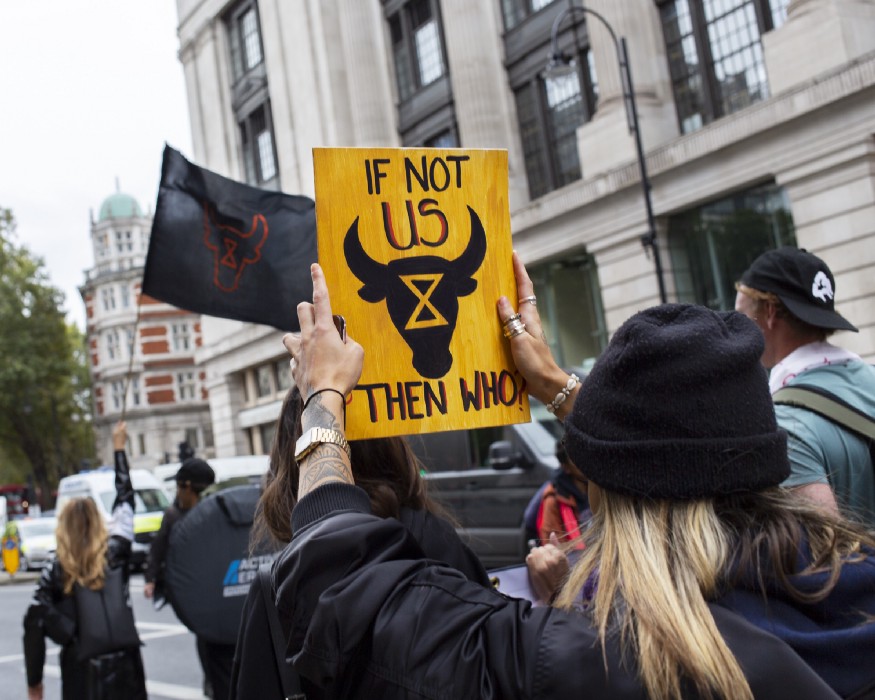*Originally published 24 April 2020*
The domino effect is when one change occurs, triggering another and then another. This is the situation for many countries around the world right now. The first change always feels like the hardest adjustment but, once people get used to it happening we begin to embrace new things more quickly. Branching out of our comfort zones seems scary at first, but change is not really difficult: it is inevitable. We need to abandon the ‘business as usual’ approach and, instead, take radical action to ensure that the future we want — to live in a just and sustainable world — becomes our present. Protecting our future cannot be done by anyone alone but requires the combined efforts of governments and systemic change.
As a result of COVID-19, the UK is in a current state of lockdown, as are many other cities and countries across the world. It is highly likely that COVID-19 is a zoonotic disease, meaning it was transmitted from non-human animals to humans. Other zoonotic diseases in the past include SARS, Ebola and HIV which, together, killed millions of people worldwide. Zoonotic diseases are usually spread by wildlife and farmed animals, which is exacerbated by intensive animal farming and, thus, the meat industry. A global plant-based food system will dramatically reduce our chances of contracting future zoonotic diseases, while simultaneously reducing greenhouse gas emissions and helping to mitigate the current climate emergency.
Life is very different right now. Many of us are risking our lives to go to work, whilst many others are forced to work from home or not at all. We now queue outside supermarkets, connect with friends and family through video calls, attend online quizzes and seminars, and we have more apps on our phones than ever before. We take full advantage of our daily allowance of exercise, whether we prefer to cycle, run, or walk; our time spent outside has become precious. We have had to adapt to this new way of living in a very short period of time.
The fragility of our food system has been highlighted during COVID-19. Research by the Food and Land Use Coalition found that just 1% of the yearly £560 billion government paid farm subsidies is used in ways to protect the environment; it is mostly used in destructive practices, such as deforestation. Since the pandemic began, we have seen empty shelves in our supermarkets and there are still ingredients we cannot find. Unharvested vegetables have been left to rot due to worker shortages. Fortunately, most of us will survive this pandemic, but we cannot risk similar situations in the future. We do not yet know how infectious COVID-19 is, as not all cases have been identified, but it is likely that the next pandemic will be worse. Severe food shortages are probable and the death toll may be considerably higher.
There is no denying the devastating cost of the COVID-19 pandemic, but we must find lessons in our experiences and silver linings where possible. Communities across the world have pulled together to help each other. The voluntary sector has been inundated with volunteers, as 750,000 have signed up to help the NHS alone. This influx of volunteers has not been seen since the war. Young people shop for their vulnerable neighbours, while others trade food supplies over the garden fence. WhatsApp groups have been created to connect entire streets, who give each other support and offer tips for keeping busy during the lockdown.
There are two key points to note: firstly, how quickly this transformation has happened; and secondly, how quickly we have all adapted. This begs the question: is change really that difficult? The answer will, of course, vary on an individual basis but, from a systemic and government viewpoint, the answer is, no. COVID-19 has shown us how quickly things can move during a crisis. This speed of transition needs to be applied to the climate crisis too. In politics, we are forever told that “there is no money for this and no money for that”, which squashes campaigns for new sustainable policies and practices. Though, in this pandemic, the Government appears to have suddenly found enough cash to pay 80% of millions of people’s salaries as part of the new Furlough scheme. The cost was estimated at £42 billion, and this is before the scheme was extended by a month. Not to mention the potential millions of pounds the Government may pay in big business bailouts, such as airlines.
Governments have a history of implementing new policies during times of crisis, which are designed to go unnoticed. Naomi Klein’s award winning book, The Shock Doctrine, reveals America’s exploitation of national crises to establish controversial policies. America is certainly not the only culprit at fault for doing this and, already, the UK Government is talking about bailouts, though this is rarely publicised through mainstream media. Animal Rebellion has been campaigning for #NoDairyBailouts, an industry that has been in decline for some time and which relies heavily on government subsidies. The UK Government recently declared they would not bailout the dairy industry at this time, but we must ensure they stick to their word. At the same time, we must also ensure the Government does not use taxpayers money to bailout the beef industry and airlines, both of which seriously contribute to global warming.
Claims that governments do not have enough money to lead a transition towards a sustainable future is unfounded. A new report by the International Renewable Energy Agency proposes the Transforming Energy Scenario (TES), which offers ‘a sustainable, low-carbon climate safe foundation for stable, long-term economic development’, ensuring global warming remains below 2°C and in line with the Paris Agreement. The TES plans to transform energy pathways, based mostly on renewable sources and vastly improved energy efficiency. To return to ‘business as usual’ after the lockdown is estimated to cost $95 trillion globally. The TES is proposed to cost $110 trillion, though it would generate savings of an estimated $50 trillion to $142 trillion by 2050, effectively paying for itself. To pursue a ‘business as usual’ approach, when such blatantly more cost effective, beneficial and sustainable options are possible, would be sheer ludicracy.
Following this lockdown we will have one joint responsibility: not to allow a return to ‘business as usual’. By learning from these lessons, we can take action to help prevent future crises. Must we really wait for the next pandemic before humans understand the true severity of the climate emergency we are facing? One opinion poll reports that 48% of the public would like to see the government respond to the climate crisis ‘with the same urgency’ as it has done with this pandemic, and only 28% disagreed. The Government must take responsibility and act in the public’s interest; ‘business as usual’ is not a satisfactory response to COVID-19 nor the climate emergency we are facing.
COVID-19 has presented us with an opportunity — though it comes with devastating costs — for radical change. The lockdown has proved that it is possible for the Government to implement quick radical action and that humans are capable of adapting swiftly. We know there are viable proposals, such as the Transforming Energy Scenario, that will combat the climate emergency, without the added financial burden that would otherwise result from a ‘business as usual’ approach. We must act now to prevent more crises, whether related to health, economical or environmental. A just and sustainable future for all is within our reach.

